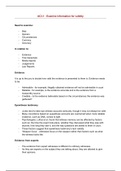AC3.1 - Examine information for validity
Need to examine:
- Bias
- Opinion
- Circumstances
- Currency
- Accuracy
In relation to:
- Evidence
- Trial transcripts
- Media reports
- Judgements
- Law Reports
Evidence
It is up to the jury to decide how valid the evidence is presented to them is. Evidence needs
to be:
- Admissible - for example, illegally obtained evidence will not be admissible in court
- Reliable - for example, is the evidence accurate and is the evidence from a
trustworthy source
- Credible - Is the evidence believable based on the circumstances the evidence was
gathered?
Eyewitness testimony
- Juries tend to take eye witness accounts seriously, though it may not always be valid.
- Many convictions based on eyewitness accounts are overturned when more reliable
evidence, such as DNA, comes to light
- Psychologists, Loftus et al, found that witness memory can be affected by factors
such as: the time the event took place, whether they discussed what they saw with
anyone, how long they saw it, and the way questions are asked to them in court.
- These factors suggest that eyewitness testimony’s lack validity
- ‘Weapon focus’ - witnesses focus on the weapon rather than factors such as what
the witness looks like
Evidence from experts
- The evidence from expert witnesses is different to ordinary witnesses.
- As they are experts on the subject they are talking about, they are allowed to give
their opinions.
, - Jurors give great weight to experts, and this can dramatically change the verdict that
they come to
- Miscarriages of justice - this can happen if the evidence given is inaccurate, as seen
in the case of Sally Clarke
Forensic Evidence
- DNA evidence can provide highly valid information as everyone’s DNA is unique
- However, forensic evidence can be contaminated, which can lead to the wrong
person being accused as seen in the case of Adam Scott
Trial transcripts
- It is a written record of everything that is said in court
- Crown court hearings are always recorded, Magistrates hearings are not
- It is evidence which a defendant can use in an appeal and can also be used by the
Parole Board to determine if someone should be released from prison
Are they valid?
- They are highly accurate and unbiased reports - they are not noted down by instead
by a digital system
- There is a slight risk that the technology could malfunction and so it would be be
recorded accurately, words could get distorted
- Circumstances within the courtroom may affect the validity, for example if the noise
levels were high
Media
Political bias
- Media outlets have different political bias’ - the Mirror is more left leaning then the
Sun, who support the Conservatives
- TV and radio have a duty to be impartial and not show a particular bias to one side or
another
Right wing papers - more likely to support police, demonise offenders
- Left wing papers - critical of institutions like the police and government
- Need to take into account these bias’ when assessing the validity of the information
Moral Panics
- Media sensationalise coverage in order to attract larger audiences and improve profit
(mods and rockers in the 1960’s)
- Exaggerated reporting does not give an accurate portrayal of the seriousness of the
crime or amount of crime which is occuring
Stereotyping





